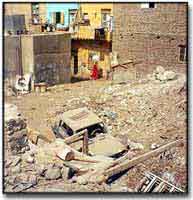 |
Aga Khan, spiritual leader, promotes conservation in urban planning, education |
(c) Earth Times News Service |
The Aga Khan's vision is reflected in the network of institutions he guides today, including hospitals and health care facilities, academic institutions, rural development programs and financial institutions. The cultural arm of his development network, the Aga Khan Trust for Culture (AKTFC), is based in Geneva and was established in 1988 as a nonprofit foundation. The Trust's three main programs-in architecture, architectural education and urban conservation-share this vision, but are implemented differently: The Aga Khan Award for Architecture was created 20 years ago to promote excellence in architecture by recognizing outstanding projects in the Muslim world involving the restoration of historic buildings, the re-use and conservation of public open spaces, or the use of environmentally friendly landscaping techniques. Selected by an independent international jury in cycles of three years, the award (totaling $500,000 every three years) is considered by some architects to be the largest and most prestigious architectural recognition in the world. The Architectural Education Program has since 1979 sponsored the Aga Khan Program for Islamic Architecture at Harvard University and the Massachusetts Institute of Technology, educating architects and planners in Muslim building and designing throughout the world. And the Historic Cities Support Program (HCSP), which was established in 1992, supervises the implementation of conservation and rehabilitation projects initiated by the Trust. "The Historic Cities Support Program is an outgrowth of the learning from the award program," said Tom Kessinger, Managing Director of the Trust. He added that it started when the Aga Khan became interested in the potential of selecting individual buildings in historic cities in the Muslim world that were particularly potent and interesting in terms of what they symbolize, but could also be used and reused for contemporary development to benefit the surrounding community in socio-economic terms. It has projects in Karimabad, Pakistan, in Mostar, Bosnia, Samarkand and Zanzibar. Although the Aga Khan is the leader the Ismailis revere as their Prophet, he insists that his development efforts are never limited to his followers. One of the defining characteristics of the Aga Khan, according to several people who work with him, is that his emphasis is on planning for the future, using appropriate technology that reflects and respects the past while ensuring that buildings are relevant for current environments. "There is no place where we end up being for a short period of time," said Kessinger. "And I think that's very much a reflection of how he sees the development process."
|